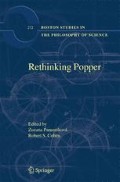Among “the great generation”, Popper claims, Socrates has contributed more than any other intellectual to the new faith of the open society and even died for it (Popper 1945, Vol. 1, pp. 128, 189). Bearing on the ‘Socratic problem’, Popper insisted that the historical Socrates, especially in the Crito and the Apology, didn't have any metaphysical theory nor made any effort to theorize (ibid., pp. 301–302). While also acknowledging that the figure of Socrates in the later early period dialogues, in Gorgias for example (ibid., pp. 302–303), gradually becomes more positive and assertive, these theories are attributed to Plato. However, Poper didn't discuss more systematically Socrates' theories in the early dialogues, which according to later commentators (Vlastos 1991; Prior 2004) play a significant role. Do these theories justify a different understanding of Socrates? Trying to answer this question I will re-examine Popper's portrayal of Socrates by focussing on his figure as a claimer of knowledge in three prominent early dialogues: the Apology, the Protagoras and the Meno. I suggest that, while all his claims of knowledge are compatible with ‘Platonist’ doctrines, the ‘Socratic’ principles are due to the explicit and implicit criticism of these claims through the dialogue. In this respect whereas the ‘Socratic’ principles aren't manifested in the Apology, although reminded in the trial, they are better manifested in the Protagoras and the Meno, at least partly.
Access this chapter
Tax calculation will be finalised at checkout
Purchases are for personal use only
Preview
Unable to display preview. Download preview PDF.
References
Allen, Reginald. 1971. Plato's Earlier Theory of Forms. In The Philosophy of Socrates, ed. Gregory Vlastos, pp. 319–334. New York: Garden City.
Baruch, Herzl. 2004. Knowing and Knowledge in the Meno. Delivered at Contemporary Issues in Epistemology, Soochou University (Tai Pe) (11–13 June).
Benson, Hugh. 2000. Socratic Wisdom: The Model of Knowledge in Plato's Early Dialogues. Oxford: Oxford University Press.
Brandwood, Leonard. 1990. The Chronology of Plato's Dialogues. Cambridge: Cambridge University Press.
Kraut, R. 1999. Socrates and Democracy. In Plato 2 — Ethics, Politics, Religion and the Soul, ed. Gail Fine, pp. 34–53. Oxford: Oxford University Press. (A former version, 1985, under the same title see in: Popper and the Human Sciences, eds. Gregory Currie and Alan Musgrave, pp. 85–203. The Hague: Martinus Nijhoff Publications.)
Penner, Terry. 1992. Socrates and the Early Dialogues. In The Cambridge Companion to Plato, ed. Richard Kraut, pp. 121–169. Cambridge: Cambridge University Press.
Plato. 1997. Complete Works, ed. John Cooper. Indianapolis, IN: Hackett.
Popper, Karl Raimund. 1945. The Open Society and Its Enemies, Vol. 1. London: Routledge & Kegan Paul.
Popper, Karl Raimund. 1963. Conjectures and Refutations. London: Routledge & Kegan Paul.
Popper, Karl Raimund. 1979 (first edition 1972). Objective Knowledge. Oxford: Oxford University Press.
Popper, Karl Raimund. 1994. Knowledge and the Body—Mind Problem. London: Routledge.
Popper, Karl Raimund. 2002 (first edition 1999). All Life Is Problem Solving. London: Routledge.
Prior, William. 2004. Socrates Metaphysician. Oxford Studies of Ancient Philosophy xxvii: 1–14.
Vlastos, Gregory. 1991. Socrates: Ironist and Moral Philosopher. Cambridge: Cambridge University Press.
Weiss, Roslyn. 2001. Virtue in the Cave: Moral Inquiry in Plato's Meno. Oxford: Oxford University Press.
Xenophon. 1996. The Shorter Socratic Writings: “Apology of Socrates to the Jury”, “Oeconomicus” and “Symposium”, trans. and ed. Robert Bartlett. Ithaca, NY: Cornell University Press.
Author information
Authors and Affiliations
Editor information
Editors and Affiliations
Rights and permissions
Copyright information
© 2009 Springer Science + Business Media B.V.
About this paper
Cite this paper
Baruch, H. (2009). Re-examination of Popper's Portrayal of Socrates. In: Parusniková, Z., Cohen, R.S. (eds) Rethinking Popper. Boston Studies in The Philosophy of Science, vol 272. Springer, Dordrecht. https://doi.org/10.1007/978-1-4020-9338-8_23
Download citation
DOI: https://doi.org/10.1007/978-1-4020-9338-8_23
Publisher Name: Springer, Dordrecht
Print ISBN: 978-1-4020-9337-1
Online ISBN: 978-1-4020-9338-8
eBook Packages: Humanities, Social Sciences and LawPhilosophy and Religion (R0)

